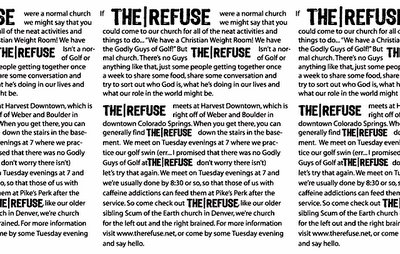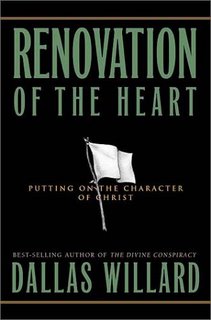
The last couple of weeks we’ve been looking at forgiveness. Last week we talked about stopping & acknowledging the hurt we’ve inflicted upon someone else; dropping everything to make it right; & then giving our gift to God after we’ve been reconciled. Nothing maters to God like relationships. I’ve likened the forgiveness idea to taking a swig of Buckley’s Cough medicine; it tastes bad but is good for you in the long run.
Sometimes it seems the only lesson in life that's harder than learning how to forgive is learning how to receive forgiveness.
Theoretically, we all learned to say, "I'm sorry" in kindergarten, but those words may not come easy to an adult.
Question: a moment of honesty: have you ever made a mistake, done something wrong, & you knew it was wrong at the time or you found out soon-thereafter that it was wrong. And yet you didn’t correct it. You bluffed your way through it, or you bullied your way through it, or you just ignored it and pretended that it never happened. Hands up.
We’ve all done it before. But we’re not happy with ourselves are we? Over time we sear our conscience, and the mistakes crop up again & again until we have a great big fall.
All the while God watches us, sad that we don’t follow the road map to reconciliation.
Much has been said about looking to Jesus as our role model for offering grace, but reconciliation can be short-circuited by a failure on the other end, the receiving end.
The "guilty" partner perhaps is unwilling to receive or sees no need to receive forgiveness. God offers forgiveness, but for us to be restored and reconciled, for the relationship to be healed, the guilty party must have the right spirit. The Bible calls it repentance. Fortunately, God gives us a model. We're to receive forgiveness the same way He tells us to receive His Love.
Hebrews 10:22
let us go right into the presence of God, with true hearts fully trusting him. For our evil consciences have been sprinkled with Christ's blood to make us clean, and our bodies have been washed with pure water.
2 Samuel 11 David, Bathsheba, and Uriah The Hittite
2 Samuel 12 Nathan confronts David, David turns from his wicked way
1. Accept what cannot be changed (chapter 12, vv. 22-23)
Before you apologize to someone, it helps to go before God, as the psalmist often did, and reflect on your mistake. Yes, I blew it, but why? Was I jealous? Was I afraid? Was I angry? In the safety of God's presence, you can admit your true but often repulsive motives. You then can ask for forgiveness and the strength to admit these faults to the person you hurt.
You must get past the “If Only” stage to move forward. It’s done. What’s done is done.
2. Give it up to GodWe can turn 3 places:
-Inward in pity
-Outward in ‘validate me’ or numb the pain or
-Upward and see God alone as our strength and peace.
Isaiah 6:1In the year King Uzziah died, I saw the Lord. He was sitting on a lofty throne, and the train of his robe filled the Temple.
In the year our whole world fell apart, the year my husband/wife died, the year I stepped into terrible sin, God was
still on the throne.
Psalm 51Have mercy on me, O God, because of your unfailing love.
Because of your great compassion, blot out the stain of my sins.
Wash me clean from my guilt.
Purify me from my sin.
For I recognize my shameful deeds--they haunt me day and night.
Against you, and you alone, have I sinned;
I have done what is evil in your sight.
You will be proved right in what you say, and your judgment against me is just.
For I was born a sinner--yes, from the moment my mother conceived me.
But you desire honesty from the heart, so you can teach me to be wise in my inmost being.
Purify me from my sins, and I will be clean; wash me, and I will be whiter than snow.
Oh, give me back my joy again; you have broken me--now let me rejoice.
Don't keep looking at my sins.
Remove the stain of my guilt.
Create in me a clean heart, O God.
Renew a right spirit within me.
Do not banish me from your presence, and don't take your Holy Spirit from me.
Restore to me again the joy of your salvation, and make me willing to obey you.
Then I will teach your ways to sinners, and they will return to you.
Forgive me for shedding blood, O God who saves; then I will joyfully sing of your forgiveness.
Unseal my lips, O Lord, that I may praise you.
You would not be pleased with sacrifices, or I would bring them.
If I brought you a burnt offering, you would not accept it.
The sacrifice you want is a broken spirit. A broken and repentant heart, O God, you will not despise.
There seems to be very little remorse, little repentance, before God today, even in churches. That’s sad because it is only God who can deliver us from the radical evil in our heart, body and soul.
It is common for Christ-followers to talk about their ‘brokenness’, but when we listen closely we discover that they’re talking about their
wounds, the things that they’ve suffered, not about the
evil that is in them.
And yet genuine remorse is the first step back from our lostness in relationship, our alienation from others, be it from actions or ours. Sometimes when we’ve been hurt the other person has just beaten us to the punch.
Without our realization that we are utterly ruined and helpless before God, and without the genuine redirecting of our lives to dealing with this fact, there is no clear path to inner transformation.
“Brokenness isn’t so much about how bad we’ve been hurt but how we’ve sinned in dealing with it.” Larry Crabb
As a part of giving it to God is to make it right with others. Remember the greatest commandment we looked at last week: love God with all your heart, soul, and your mind and love your neighbor as yourself. Here you have a guide for authentic restoration. It starts with attitude.
* The Humble Heart, seeking mercy, not grace.
* The Apologetic Heart, eager to change.
* The Faithful Heart, reaffirming the relationship.
* The Loving Heart, ready to work.
A. Come with a
humble heart, seeking mercy, not grace. If I've wronged somebody, I deserve nothing from him/her. Certainly not grace. The only appropriate way to approach the person is the way I approach God when I'm seeking a restored relationship with Him.
Luke 18:13"But the tax collector stood at a distance and dared not even lift his eyes to heaven as he prayed. Instead, he beat his chest in sorrow, saying, `O God, be merciful to me, for I am a sinner.
I should seek only mercy, which we know is to have the one I've offended not give me what I deserve.
Grace: getting what I don’t deserve
Justice is getting what I deserved; &
Mercy is not getting what I deserved.
"Be merciful to me, " says I'm bringing no expectations to the table. What I receive is entirely the other person’s call. I demand nothing, but humbly seek mercy.
What makes a difference in an apology is a sincere desire to mend the situation. If you only want to get yourself out of a sticky situation without owning up to what you've done, it won't work. That’s not humility. That’s arrogance!
B. Come with an
apologetic heart, eager to change. So I come seeking only mercy. Can I at least hope for grace? Sure! But it rightfully hinges on my response to my own selfishness and sin. As the offender, I must have an eager heart to clean up my act.
I don't come simply appealing to the other person’s merciful nature. I come saying I'm aware of my error and am willing to walk away from it….to change my ways.
And I need to be willing to solicit help in figuring out what kind of changes need to take place. I need to let the person tell me what needs to change to improve our relationship.
The person you've hurt needs to hear from you how you plan to make things right. You're not only looking for pardon, but for restoration. The opposite of the apologetic heart is the shameless heart.
C. Come with a
faithful heart, reaffirming the relationship.
Hebrews 10:23
Without wavering, let us hold tightly to the hope we say we have, for God can be trusted to keep his promise.
When I come to a friend requesting forgiveness, I need to say, "By the way, I want you to know that I'm committed to our relationship." I need to assure my friend that my misbehavior is a lapse in judgment, not a signal that I'm bailing on my commitment. The opposite of the faithful heart is the disloyal heart.
After enduring angry words or unkind remarks or extended insensitivity or worse, it would be perfectly normal for a person to wonder whether those offenses revealed cracks in the foundation of the relationship. You need to deal with that reaction quickly and clearly.
If the issue is marital related then you assure your spouse of your unconditional, lifelong commitment to your marriage. This is crucial to restoration when the relationship has been wounded by infidelity. Your spouse needs to look deeply into your eyes and see the reality expressed of your repentence and remorse and depth of your commitment.
D. Come with a
loving heart, ready to work at the relationship.
There needs to be a recommitment to let your friend know you mean business when it comes to your relationship.
Whether you are on the giving end of grace or the one receiving it, you're engaged in one of life's most difficult assignments. When we've been wronged, forgiveness runs absolutely counter to our nature. And when we've injured someone we love, a battle rages within our heart as we try to rationalize our behavior and minimize our responsibility. The idea of coming clean and throwing ourselves at the mercy of the one we've offended, expecting nothing in return, flies in the face of our sense of pride and self-preservation. But according to God’s Plan, it's the only way to go. The opposite of the loving heart is the proud and selfish heart, only concerned with itself.
3. Focus on what is left, not lostDavid messed up, Bathsheba is pregnant, Uriah is dead, and the baby dies, and years later his whole family is severely messed up. It’s worse than any soap opera!
David was bored and that lead to his situation with Bathsheba. Well later, he becomes way too passive with the sin raging in his family. Was he stuck in the past? I think so.
Our spiritual enemy wants us to look to the past, while God wants us to look to the future. As we talked about last month, we tend to remember the things we should forget and forget the things we should remember.
The past cannot be changed but the meaning of the past can be changed.
The Rose bowl is called the granddaddy of all college football games in the US. This year is USC vs. Texas. Sorry Shanley, but USC beats Texas for the title!
The most famous Rose Bowl was 1929:
In one of the odder moments in college football history, Roy “Wrong Way” Riegels fielded a fumble in the 1929 RB against Georgia Tech and ran 64 yards toward the wrong end zone before teammate Benny Lom was able to track down and convince Riegels of his error at Cal’s one yard line. The Bears’ ensuing punt was blocked and Georgia Tech recorded a safety for the difference in Cal’s 7-8 loss.
Coach says everyone who started the 1st half get in there for the 2nd. “Riegel’s you are my player. You made a mistake & now get out there & win!”
He was a) forgiven & then b) given a second chance.
Jesus means “
the Lord saves”. He didn’t come to condemn us, but to save us! He’s the God of second chances.
Isaiah 43:18-19
"But forget all that--it is nothing compared to what I am going to do. For I am about to do a brand-new thing. See, I have already begun! Do you not see it? I will make a pathway through the wilderness for my people to come home. I will create rivers for them in the desert!
Screwed up in the past, join the club. Don’t die there!
"Spirituality is not a formula; it is not a test. It is a relationship. Spirituality is not about competency; it is about intimacy. Spirituality is not about perfection; it is about connection. The way of the spiritual life begins where we are now in the mess of our lives. Accepting the reality of our broken, flawed lives is the beginning of spirituality not because the spiritual life will remove our flaws but because we let go of seeking perfection and, instead, seek God, the one who is present in the tangledness of our lives." Mike Yaconelli
Matthew 1:5-6Salmon was the father of Boaz (his mother was
Rahab). Boaz was the father of Obed (his mother was Ruth). Obed was the father of Jesse. Jesse was the father of King David. David was the father of Solomon (his mother was
Bathsheba, the widow of Uriah).
Rahab the prostitute? The harlot? Which of you women present today would like to have a nickname like that? Any first century Jew would be saying "don't remind me about David's misake, either!"
Matthew 1:21-22
And she will have a son, and you are to name him Jesus, for he will save his people from their sins." All of this happened to fulfill the Lord's message through his prophet
Our heart has to be ready for Jesus. There is no need to be saved if you’re not in trouble. Until we can admit our need, we’ll keep God at a distance. Is your heart ready?
Psalm 32:3-4When I refused to confess my sin, I was weak and miserable, and I groaned all day long.
Day and night your hand of discipline was heavy on me.
My strength evaporated like water in the summer heat.
When was the last time you said, "I'm sorry" to God, or anyone else?
 As you contemplate the thought of changing things in your life, be it behaviors or appearances, what thoughts and feelings go through your mind?
As you contemplate the thought of changing things in your life, be it behaviors or appearances, what thoughts and feelings go through your mind?


























